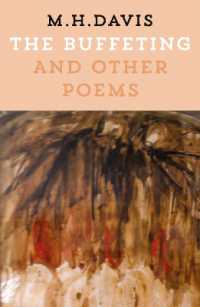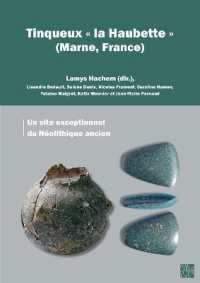- ホーム
- > 洋書
- > 英文書
- > Politics / International Relations
Full Description
This volume investigates nuclear energy policies in Western Europe over the entire post-war period, but with special attention to the two most recent decades. The comparative analytical perspective draws on the interplay between voters' attitudes, challenging movements, party competition, and coalition formation. Spanning more than 60 years and 16 countries, the researchers examine the underlying causal processes leading to the observed varieties of Western European nuclear energy policies. Based on a mixed methods approach using both structured case studies as well as quantitative analyses, the study shows that the nature of party competition under given institutional contexts is a key-driver for, as a rule, tactically motivated governmental policy changes and stability, respectively.
Part I introduces the practical and theoretical relevance of the topic. It outlines the reasoning of the major scientific contributions with regard to nuclear energy policies, and offers a theoretical alternative to the previous literatures that has been predominantly movements-oriented. Additionally, it provides core economic and political indicators of the changing role of nuclear energy in the countries. Part II consists of seven in-depth case studies where the outlined theoretical perspective is applied. Part III consists of a general summary, short narratives of the countries not covered in case studies, qualitative comparison and an assessment of the factors for policy change from multivariate analysis.
Contents
1: Wolfgang C. Müller and Paul W. Thurner: Nuclear Energy in Western Europe: Revival or Rejection? An Introduction
2: Wolfgang C. Müller and Paul W. Thurner: Understanding Policy Reversals and Policy Stability in Individual Countries
3: Paul W. Thurner and Wolfgang C. Müller: Comparative Policy Indicators on Nuclear Energy
4: Paul W. Thurner, Sylvain Brouard, Isabel Guineaudau, Martin Dolezal, Swen Hutter, and Wolfgang C. Müller: The Conflict over Nuclear Energy: Public Opinion, Protest Movements, and Green Parties in Comparative Perspective
5: Wolfgang C. Müller: Austria: Rejecting Nuclear Energy-From Party Competition Accident to State Doctrine
6: Sylvain Brouard and Isabelle Guinaudeau: Nuclear Politics in France: High Profile Policy and Low Salient Politics
7: Paul W. Thurner: Germany: Party System Change and Policy Reversals
8: Fabio Franchino: Italy: Leading and Lagging: Innovation, Delays and Coalition Politics in Nuclear Energy Policy
9: Kees Aarts and Maarten Arentsen: Nuclear Power and Politics in the Netherlands
10: Sören Holmberg and Per Hedberg: The Will of the People? Swedish Nuclear Power Policy
11: Hanspeter Kriesi: Switzerland
12: Wolfgang C. Müller, Paul W. Thurner, and Christian Schulze: Conclusion: Explaining Nuclear Policy Reversals
Appendix: Other European Countries ? An Analytical Reconstruction: Paul W. Thurner, Wolfgang C. Muller, and Christian Schulze:
Appendix: Policy Scales for a Country's Nuclear Energy Policy:








